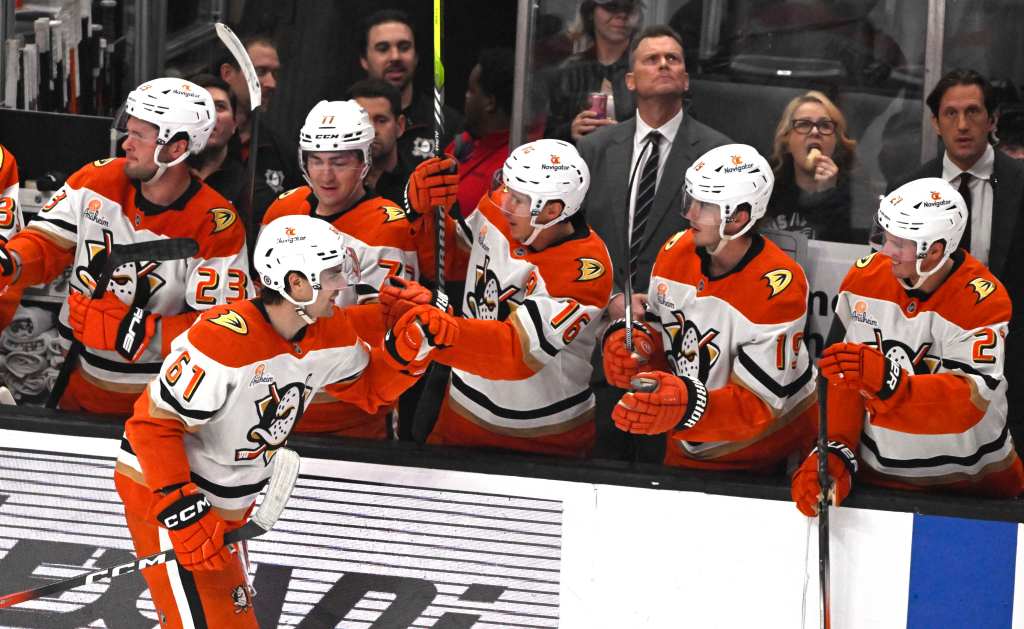
Although they barely squeaked across the 80-point threshold this season, the Ducks were the West’s most-improved team, vaulting themselves from a disappointing 59-point campaign with a franchise-record 50 regulation losses to an 80-point effort with 13 fewer regulation defeats.
It was the second season behind the bench for Greg Cronin and the first as captain for Radko Gudas, who filled the role for the first time since Ryan Getzlaf’s 2022 retirement. He led a group that skewed young, and heavily so, having gotten more points and more goals from players 21 years old and younger this season than any other squad.
“We took a step in the right direction and I like where we’re heading,” Gudas said. “The leadership group in this locker room is doing a pretty good job of holding everybody accountable, trying to take it day by day and trying to play every game like it’s our last.”
Cronin said that he often used the word “mystery” referent to the rebuilding process, because it was hard to determine how players would respond to greater accountability and higher standards. Indeed, general manager Pat Verbeek said that he felt the team experienced “culture shock” in Year 1 under Cronin, but that they grasped both general expectations and specific concepts better in Year 2.
“(Development) was a priority back in October. Pat and I have talked about this repeatedly, we’ve got to accept some of these failures,” Cronin said as the Ducks missed out on the postseason for a sixth consecutive season. “We could lose games because we’re playing these young kids, but they’re gonna learn in that environment. I’m proud of the way they’ve played.”
Cronin and Ducks assistant coach Tim Army both spent time in the Colorado Avalanche system – the Avs swept the Ducks this year and are a short-list contender much as they were in 2022 when they won the Stanley Cup – and Cronin recalled nascent stages in Denver, when Army was with the organization that he would soon join.
“They were getting smoked (during Nathan MacKinnon’s) first three years, they were getting killed,” Cronin said. “This is what happens. I get it, people get impatient, but there’s no measurables for young kids developing. I wish there was, but there’s not.”
While consistency, particularly but not exclusively on special teams, was a significant issue, the Ducks’ top-end showings were impressive. They went 2-0-1 against the Presidents’ Trophy-winning Winnipeg Jets and the team right behind them in the Central, the Dallas Stars. They also took three of four matchups with the defending Western Conference champion Edmonton Oilers. They came from behind in each clash with Edmonton, including one of their nine third-period rallies, and once dominated the Oilers thoroughly.
“We’ve had a lot of games where we’ve played really, really well. Not too many teams go into Edmonton and win 6-2, they [only] got the two power-play goals,” Cronin said. “I think the Winnipeg win at home was a huge one in terms of playing a heavyweight team.”
Much of the campaign was buoyed by goaltending, principally that of ascendant star Lukáš Dostál but also from veterans John Gibson and, late in the season, Ville Husso. Much of the early going saw the Ducks lean heavily on a forward trio of Troy Terry, Frank Vatrano and Ryan Strome, both to provide scarce offense and to match up with other teams’ most dangerous lines. They ranked Nos. 1, 2 and 3 in scoring through Jan. 15, with meteoric riser Jackson LaCombe just behind them as the Ducks’ top producer on defense.
Most troubling was a lack of tangible progress for some of the Ducks’ top young players: Leo Carlsson, Mason McTavish and Cutter Gauthier were among those who missed the starter’s pistol firing. Trevor Zegras sustained another serious injury, while a crowded blue line limited work for Pavel Mintyukov and Olen Zellweger at times.
Yet in the second half, McTavish, Carlsson, Gauthier, LaCombe and Zegras were the five most prolific Ducks. They combined for 133 points in 185 games from Jan. 15 onward, giving the Ducks’ noticeable scoring balance while Isac Lundeström’s line proved capable in a shutdown role, too.
“Since the break, our young players have really taken a step and actually carried this team,” Verbeek said.
Verbeek likened team play to building one’s golf game, with many different, discrete elements that took time to lock into place. He said his main focus moving forward, despite a deep belief in the existing group, would be adding offense.
“I’d like our group to be able to score more. If you look at the top teams, they score a minimum of 250 goals, and so that’s something that’s we’re gonna look at,” Verbeek said.
Special teams was another area of dire need, with power-play pop being especially sparse. They finished 29th of 32 teams in penalty-kill percentage, but at least enjoyed encouraging stretches, including late in the season when they began pressuring the puck more and using skill players shorthanded.
Their power play, on the other hand, was dead last in the NHL and very seldom generated so much as momentum. Cronin and Verbeek concurred that those situations weighed heavily on the team’s results.
“If our special teams were better on both sides, we’d be sitting in a playoff spot,” Verbeek said.
Originally Published:



